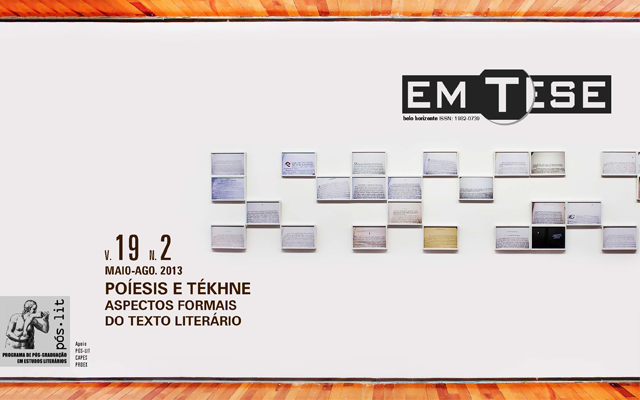O episódio do Ciclope no canto IX da "Odisseia"
uma paródia da cena-típica de hospitalidade
DOI:
https://doi.org/10.17851/1982-0739.19.2.122-136Palavras-chave:
Homero, Odisseia, Ciclope, cenatípica, hospitalidadeResumo
O episódio do Ciclope na Odisseia representa uma completa subversão dos elementos da cena-típica de hospitalidade. Mais do que isso, ele vem a ser o que Reece chamou de “uma paródia da cena-típica de hospitalidade”. Logo, nosso intuito é contemplar os elementos que compõem essa cena paródica.Referências
CLAY, Jenny Strauss. The Wrath of Athena: Gods and Men in the Odyssey. In. CLAY, Jenny Strauss. The wrath of Athena. New York: Rowman & Littlefield Publishers, 1997, p. 112-132.
DÉMÉTRIOS. Du style. Trad.: Pierre Chiron. Paris: Les Belles Lettres, 1993.
DENYS D’HALICARNASSE. Opuscules rhétoriques. Trad.: Aujac, et Lebel. Paris: Les Belles Lettres, 1978. Tome III.
DE JONG, Irene J. F. A Narratological Commentary on the Odyssey. Cambridge: Cambridge University Press, 2004, p. 221-249.
EDWARDS, Mark W. The Type-Scenes and Homeric Hospitality. Transactions of the American Philological Association. The Johns Hopkins University Press, vol. 105, p. 51-72, 1975.
EDWARDS, Mark W. Homer and Oral Tradition: The Type-Scene. p. 284-330.
FRIEDRICH, Rainer. The Hybris of Odysseus. Jounal of Hellenic Studies, p. 17-28, 1994
GLENN, Justin. The Polyphemus Myth: It’s Origin and Interpretation. Greece & Rome, vol. 25, n. 2, p. 141-155, 1978.
GLENN, Justin. The Polyphemus Folktale and Homer’s Kyklopeia. Transactions and Proceedings of the American Philological Association. The Johns Hopkins University Press, vol. 102, p. 133-181, 1971.
HEUBECK, Alfred; HOESTRA, Arie. Commentary on Homer’s Odyssey. Vol. 2. Oxford: Claredon Press, 1990-1992.
HOMERI ODYSSEA. Recognovit Helmut van Thiel. Hildesheim; Zürich; New York: 1991.
HOMERO, Odisseia (trad. Frederico Lourenço). Lisboa: Cotovia, 2003.
PODLECKI, A. J. Guest-gifts and Nobodies in Odyssey 9. Phoenix. Classical Association of Canada, vol. 15, n. 3, p. 125-133, autumn 1961.
SAÏD, Suzanne. Les crimes des prétendants, la Maison d’Ulysse et les festins de l’Odyssée. In. SAÏD, DESBORDES,
BOUFARTIGUE, MOREAU. Études de Littérature Ancienne. Paris: Presses de l’ École Normale Supérieure, 1979, p. 9-49.
PACKARD, D. W. Sound-Patterns in Homer. Transactions of the American philological association. Baltimore, vol. CIV, p. 239-260, 1974.
PUCCI, Pietro. The I and the other in Odysseus’s story of the Cyclopes. In: PUCCI, Pietro(org.). The song of the sirens. Essays on Homer. Lanham: Rowman & Littlefield Publishers, 1998, p. 113-130.
REINHARDT, Karl. The Adventures in the Odyssey (transl. by Harriet I. Flower). In. SHEIN, Seth (org.) Reading the Odyssey. Princeton: Princeton University Press, 1996, p. 63-132.
REECE, Steve. Polyphemus (“Od”. 9. 105-564). In: REECE, Steve. (org.). The stranger’s welcome. Oral theory and the aesthetics of the homeric hospitality scene. Ann Arbor: The Michigan University Press, 1993.
SCHEIN, Seth. Odysseus and Polyphemus in the Odyssey. Greek, Roman and Byzantine Studies. Duke University, Durham, North California, vol. 11, n. 2, p. 73- 83, 1970.
VIDAL-NAQUET, Pierre. “Valeurs religieuses et mythiques de la terre et du sacrifice dans l’ Odyssée”. In. Le chasseur noir. Paris: François Maspero, 1977, p. 39-68.





